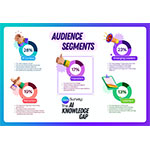To Keep Up In A Changing Workplace, Professionals Feel Need to Overstate AI Knowledge
New Canva survey indicates optimism and interest amid pressures – 60% agree AI will make them more productive at work
SYDNEY--(BUSINESS WIRE)--Canva, the world’s only all-in-one visual communication platform, has released new data on professionals’ understanding of AI as its presence in the workplace and culture expands.
From the boardroom to recent graduates, professionals at every level are navigating the rapid proliferation of artificial intelligence at work. As businesses race to reap the benefits of AI, employees are trying to balance their performance with spending time learning new tools, though many lack the time or resources to do so effectively. The result is a collective experience in which professionals are being inundated with conversation about AI, both at work and in their personal lives, but don’t yet have a deep or practical understanding of how to best use the technology.
The survey of 1,000 professionals in a business setting, conducted by global research and data partner Sago, indicates that employees are feeling increased pressure to appear tech-savvy and up to date with the latest trends amongst peers and friends. Amid this sea change, employers have an opportunity to foster AI skill-building to prevent imposter syndrome in the workplace.
The survey unveiled a range of reactions to AI’s rise:
-
Professionals feel a need to keep up appearances as they learn:
- 26% say they have sometimes exaggerated their knowledge of AI or generative AI at work to keep up with superiors or colleagues.
- 72% of professionals said they were familiar or very familiar with the term “artificial intelligence,” but this number dropped to 51% when asked about familiarity with “generative AI.”
-
Millennials are leading the uptake and adoption of AI, having the most positive perceptions of generative AI in the workplace:
- 59% said that they believe generative AI is part of the solution when it comes to helping humans achieve their full potential in the workplace, compared to 43% of Gen Z.
- Meanwhile, over a third (36%) of Gen Z said they felt like AI is a problem when it comes to humans achieving their full potential at work, compared to 18% of millennials.
-
AI know-how is increasingly important outside of work, too:
- While 35% of professionals have used AI tools in the workplace, more (43%) have used AI in a personal capacity.
- 21% of respondents say they have overstated their knowledge with friends and family. Why? 26% said it was because they did not want to look foolish for not knowing or needing to ask for clarification.
-
Even senior leaders feel behind when it comes to AI knowledge:
- More than a third of senior leaders (VPs and above) said they have exaggerated their AI knowledge in work (38%) or personal (39%) settings, suggesting that when it comes to learning AI, the playing field is level despite differences in experience.
-
Despite their knowledge gaps, professionals clearly believe in the importance of learning AI:
- 41% of professionals worry that they will fall behind in their jobs if they don’t know how to leverage AI.
- Those who have worked to improve their AI and generative AI knowledge find it fun (44%) and confidence-boosting (35%).
Given nearly all (85%) professionals indicated they are at least somewhat interested in improving their AI and generative AI skills and knowledge, employers may be well poised to offer time for learning and access to easy-to-learn tools that best suit their teams’ needs.
“The AI space is evolving faster than any one of us can grasp alone. It’s a simultaneously thrilling and overwhelming opportunity that people are naturally reacting differently to,“ said Cameron Adams, co-founder and Chief Product Officer at Canva. “In our product, we’ve tried to make it a no-brainer to start using AI when designing in Canva by embedding it in familiar or intuitive ways. A quick and empowering way to start learning AI is by using it for low-stakes tasks, like a meeting agenda or a lesson outline. Creating a culture of sharing AI experiences and learnings among teams can prevent people from feeling behind and spark new discoveries.”
To put respondents’ feelings about AI into perspective, Canva created five audience segments based on the data that reveal which professionals are driving – or detracting from – the conversation around generative AI:
- Emerging leaders – 23% of professionals surveyed – committed themselves to learning AI over the past 4-6 months and are leading or actively participating in AI work conversations. These are the "firstcomers" or "early adopters" of workplace technology.
- Learners – 13% of professionals – are starting to commit themselves to learning and are active listeners in AI conversations (soon-to-be emerging leaders). These are the "fast followers" of generative AI tools at the office.
- AI Curious – 28% of professionals – this is the "silent majority." They are currently non-users but already see the connection to gen AI and their careers. They know they should start learning, but there's a blocker (this is the next group to "convert") and the way we do that is largely a) making gen AI practice "fun and exciting," b) lean into curiosity at the consumer level to grow confidence for professional uses, and c) show how AI can help them do their work faster and improve quality.
- Detractors – 19% of professionals – are those actively pushing against AI tech, calling it "a fad" and believing it's "part of the problem" at work.
- Imposters – 17% of professionals – are often ambiguous, sometimes looking like emerging leaders (or other audiences), but their hallmark is that they admit they have stretched the truth about generative AI skills at work, and overreport knowing fake AI terms.
To learn more about Canva and how its AI tools can support your teams, visit www.canva.com/solutions.
Methodology
In July 2023, Canva commissioned Sago to survey 1,000 professionals (those who work in a business setting) on their level of comfort and understanding around AI and generative AI tools, both in and out of the workplace.
About Canva
Launched in 2013, Canva is a free online visual communications and collaboration platform with a mission to empower everyone in the world to design. Featuring a simple drag-and-drop user interface and a vast range of templates ranging from presentations, documents, websites, social media graphics, posters, apparel to videos, plus a huge library of fonts, stock photography, illustrations, video footage, and audio clips, anyone can take an idea and create something beautiful.
Downloadable Assets
Click here.
Contacts
Press Contact
Olivia Johnson
oliviajohnson@canva.com
Mission North for Canva
canva@missionnorth.com
























